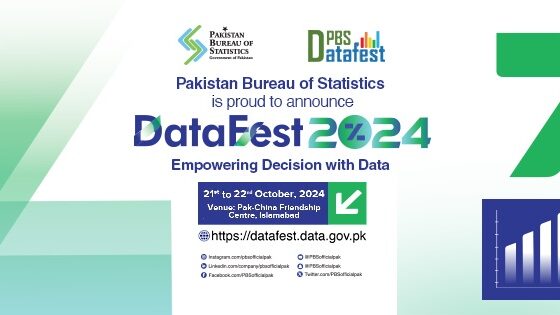In a world increasingly shaped by digital transformation, data is now recognized as one of the most valuable assets for national growth and development. Pakistan Bureau of Statistics (PBS), and their work with the country’s first-ever digital census is at the forefront of this data revolution. The digital census has transformed the way Pakistan collects and analyzes population and economic data.
The transition from traditional methods of data collection to digital ones was a monumental step toward creating a more efficient and transparent system for gathering crucial information about the population. The digital census integrates advanced technologies, including geotagging and industrial classifications, to capture a broader range of economic information. The census provides a wealth of data that is both accurate and timely, allowing governments to make better decisions, allocate resources more effectively, and drive economic growth.

To delve deeper into the significance of this digital revolution and the role of PBS in shaping Pakistan’s future, we had the opportunity to speak with Dr. Naeem Zafar, Chief Statistician at the Pakistan Bureau of Statistics (PBS).
With his background in economics, policymaking, and a deep understanding of public infrastructure, Dr. Zafar was uniquely qualified to oversee this complex transition. In this exclusive interview, Dr. Zafar discusses the impact of the digital census, the importance of data-driven governance, and the vision for Pakistan’s data landscape.
Under his guidance, PBS shifted from traditional, paper-based census methodologies to a sophisticated, fully digital system. This transition was not just an administrative change but a technological evolution. This census incorporated industrial classifications and geographical data, giving policymakers and industries insights into emerging economic zones, employment trends, and migration patterns. The successful completion of the digital census in 2023 has paved the way for Pakistan’s inaugural DataFest.
Pakistan’s First Digital Census To DataFest 2024
Pakistan Bureau of Statistics (PBS), recognizing the transformative potential of data, is organizing DataFest 2024 from October 21st to 22nd at the Pak-China Friendship Centre, Islamabad. This event, themed around “Data for Life, Governance, Fiscal Resilience, Climate Adaptation, and Development” is set to highlight the importance of leveraging data across sectors to build a more equitable and prosperous future for Pakistan. Part two of this interview article will cover all aspects of the upcoming DataFest 2024.
From Engineering to Economics: Dr Naeem Zafar’s Journey
Dr. Naeem Zafar’s journey from engineering to economics is a testament to his curiosity and passion for understanding societal systems. Originally enrolled in mechanical engineering, he soon discovered that his interests extended far beyond the technical aspects of machinery. Drawn towards the complexities of social sciences and literature, he made a pivotal shift in his academic trajectory, opting for an MBA at the Institute of Business Administration (IBA). This decision set the foundation for his future role as an economist. During his time at IBA, Dr. Zafar delved into economics and realized its profound relevance in every facet of life, from personal decisions to organizational strategies, where the principles of cost-benefit analysis often govern outcomes.
This multidisciplinary background not only provided him with a well-rounded view but also uniquely positioned him to address large-scale public policy challenges. After years of teaching at IBA and other institutions, he moved into public service, working at the Planning Commission of Pakistan and later with the United Nations on the Sustainable Development Goals (SDGs).

His diverse experiences—ranging from academia to policymaking—have enabled him to approach data-driven decision-making with a holistic perspective, making him an ideal leader at the helm of initiatives like the digital census and Pakistan’s Data Fest.
His transition into the role of Chief Economist in Sindh, where he evaluated large-scale infrastructure projects, further honed his ability to merge data with real-world impact.
Data-Driven Decision Making For Economic Growth
Data has become the cornerstone for informed decision-making in both the public and private sectors. The digital age has allowed us to collect vast amounts of information, ranging from economic activity and healthcare statistics to climate patterns and education metrics. When this data is used correctly, it becomes a powerful tool for identifying trends, predicting outcomes, and implementing solutions that lead to improvement. Dr. Zafar adds,
Without data, decision-makers are flying blind. You cannot address economic growth, poverty alleviation, or climate resilience without reliable data to guide your policies.
Dr. Zafar’s vast experience in public policy, including his tenure at UNDP and then as Chief Economist for the Government of Sindh, where he appraised large-scale infrastructure projects, underscores the need for timely data in decision-making. He emphasizes,
Data is not just about collecting numbers. It’s about providing the right information at the right time to optimize resource allocation and policy formulation.
In Pakistan, as in many other countries, national progress is increasingly dependent on how well decisions are informed by data. Governments use data to assess economic health, measure unemployment rates, and allocate resources to the areas that need them most. Businesses rely on data to understand consumer behavior, streamline operations, and identify new markets. Public health agencies use it to track disease outbreaks and coordinate response efforts, while environmental organizations utilize data to develop strategies for climate adaptation and mitigation.

The Evolution of Pakistan’s Digital Census
In countries where digital census data has been successfully implemented, we’ve seen significant improvements in urban planning, infrastructure development, and public service delivery. In Pakistan, the scope of the digital census extends far beyond simple population counting. It provides detailed insights into demographic shifts, employment trends, and urban migration patterns, all of which are crucial for effective economic planning. By utilizing this data, Pakistan can better plan its infrastructure projects, optimize resource distribution, and create policies that encourage balanced economic growth.
As Dr. Zafar points out,
“The digital census was not just about counting people. We expanded its scope to include economic units, industries, and geographical tagging. This has given us invaluable insights into how different sectors of the economy operate. With real-time data on economic zones, it helps to identify growth opportunities and allocate resources more effectively.”
PBS collaborated with NADRA, SUPARCO, and other key stakeholders to ensure that the digital infrastructure could handle sensitive data securely. He notes,
“Our partnership with NADRA allowed us to develop 16 different modules for this system. It wasn’t just about gathering data; it was about building a secure, scalable system that could handle a national exercise of this scale.”
A digital census also allows for greater inclusivity. Traditional census methods can sometimes miss marginalized or remote communities, leading to gaps in data that skew national statistics. Digital data collection methods can more easily reach underserved populations, ensuring that everyone’s needs are taken into account when planning future developments.

The census and the DataFest emphasizes PBS’s commitment to using digital innovation, integrity, and collaboration to build a more equitable future for Pakistan. But why is data so critical to this vision? Let’s delve into its significance across sectors and the role of National Statistics Organizations (NSOs) in driving economic growth.
Watch the complete video interview with Dr. Naeem Zafar on our YouTube channel:
National Statistical Organizations: A Global Model for Economic Growth
National Statistical Organizations (NSOs) play a pivotal role in providing governments, businesses, and researchers with the reliable data they need to make informed decisions. Internationally, NSOs have become the backbone of policy planning and economic development, delivering vital statistics that drive everything from fiscal policies to social programs.
By maintaining a high level of data integrity and ensuring access to real-time statistics, these organizations have been instrumental in guiding their respective countries through both periods of economic boom and crisis.
One of the key challenges for Pakistan, and indeed many developing countries, is the need for standardized, real-time data that reflects current conditions. NSOs are critical in addressing this need by ensuring that the data is not only comprehensive but also accessible to stakeholders across the economy.
Dr. Zafar believes that Pakistan can follow a similar trajectory by utilizing its growing data resources.
“The appetite for data is growing. Whether it’s in banking, agriculture, or supply chains, stakeholders are increasingly recognizing the value of data-driven insights.”
NSOs worldwide are leveraging advanced analytics and data visualization to provide governments and industries with actionable insights. From helping predict economic downturns to identifying new growth sectors, data is fundamental to modern economies.
By collecting more granular and comprehensive data, PBS is helping Pakistan move towards an informed economy where policies are backed by hard evidence. As more sectors demand these insights, organizations like PBS will face increasing pressure to deliver robust, timely data to power decision-making.

Emerging Technologies and the Future of Data Collection
When it comes to data collection, the integration of emerging technologies is key. Dr. Zafar envisions a future where automation and IoT devices could revolutionize how data is gathered and analyzed. He suggests,
“Our current data collection methods are still quite conventional. While we’ve built some proprietary software, we need more automation. For example, using cars equipped with sensors to gather real-time data on traffic and infrastructure could provide valuable insights.”
The increasing demand for real-time data will require innovative methods to collect, analyze, and share information. PBS is keen on adopting these technologies to ensure that Pakistan remains competitive in a global data-driven economy.
Dr. Zafar concludes,
“We have a lot of data in certain areas, but there are critical gaps in others, like agriculture and real estate. By filling these gaps and improving data integration, we can unlock new opportunities for growth across sectors”
A Data-Powered Future
As DataFest 2024 approaches, it is clear that the role of data in shaping Pakistan’s future cannot be understated. From improving governance and fiscal resilience to tackling climate challenges and enhancing development, the effective use of data will be crucial for the nation’s success. Events like DataFest 2024 offer an invaluable platform for fostering the collaboration and innovation necessary to make data the foundation of our economic and social progress.
Through the efforts of PBS and initiatives like the digital census, the country is laying the groundwork for a future where data-driven decision-making is at the heart of economic and social development.
Dr. Zafar’s leadership and vision, combined with PBS’s commitment to fostering a data culture, point to a more prosperous and informed future for Pakistan. He adds,
“The more we can mitigate risk and use data to drive decisions, the better we’ll be able to address poverty, improve industry productivity, and achieve sustainable development.”
Moreover, the ongoing efforts of the Pakistan Bureau of Statistics to drive digital transformation—such as through the Digital Census—will ensure that data-driven decisions become the norm across all sectors. With better data, comes better decisions. And with better decisions, comes a brighter future for Pakistan.
By embracing the power of data, Pakistan has the potential to not only meet its economic and developmental goals but to set new standards in how emerging economies can thrive in the digital age.
As Dr. Zafar leads PBS into this new era of data-driven governance, his vision for a more informed and equitable Pakistan is taking shape. DataFest is poised to inspire national momentum and collaboration, making it clear that data, when harnessed effectively, can transform not only industries but entire economies.









